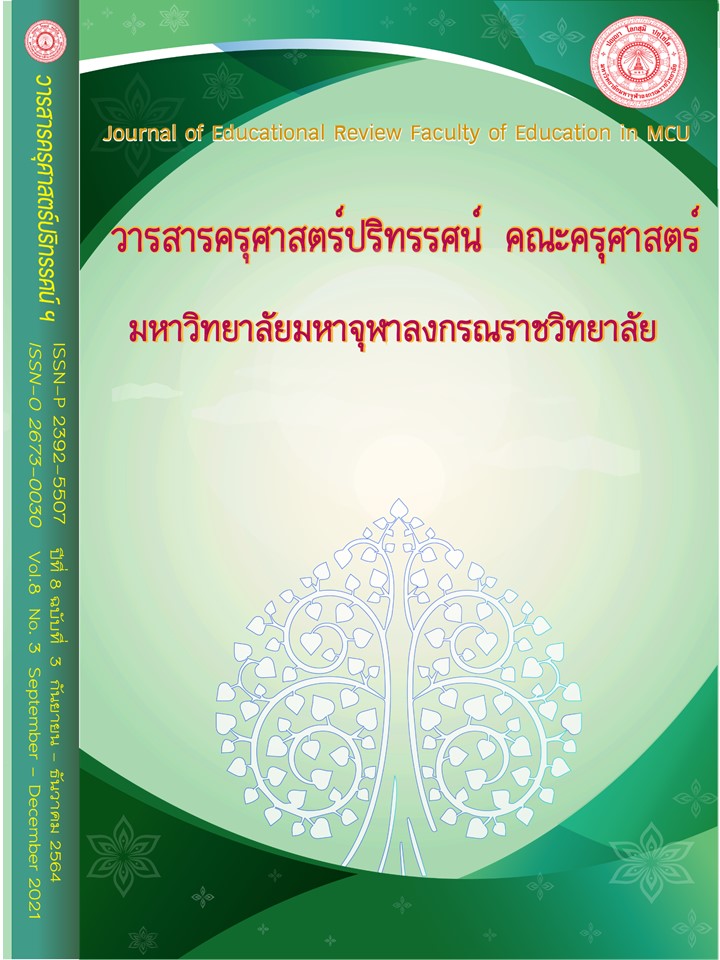AN INVESTIGATION OF LEARNING MANAGEMENT MODEL TO CREATE RELIGIOUS HEIRS OF THE THAI BUDDHIST SANGHA
Main Article Content
Abstract
This research article aimed to examine learning management model for creating religious heirs of the Thai Buddhist Sangha. Mixed methods research was used and there were 3 research steps as follows: Step 1: Study the condition of learning management for creating religious heirs of the Thai Buddhist Sangha by interviewing 10 key informants, and the data was analyzed by content analysis. Step 2: Create a learning management model for creating religious heirs of the Thai Buddhist Sangha using focus group discussion with 17 experts, and data was analyzed by content analysis. Step 3: Examine and propose a learning management model for creating religious heirs of the Thai Buddhist Sangha. It was used to distribute the model assessment form with 200 monks and novices. The data were analyzed by using descriptive statistics such as frequency, percentage, mean and standard deviation. Results of the research found that examination of the learning management model for creating religious heirs of the Thai Buddhist Sangha consisted of part 1 introduction, part 2 learning management process, and part 3 the implementation of the process in actual practice, showed overall in a high level. When considering each aspect, it was found that at the highest level in 2 aspects which were usefulness and correctness, and at a high level in 2 aspects which were feasibility and suitability.
Article Details
ทัศนะและความคิดเห็นที่ปรากฏในบทความในวารสารฉบับนี้ถือเป็นความรับผิดชอบของผู้เขียนบทความนั้นเพียงผู้เดียว และไม่ถือเป็นทัศนะและความรับผิดชอบของกองบรรณาธิการ
กองบรรณาธิการขอสงวนสิทธิ์ในการคัดเลือกบทความลงตีพิมพ์และจะแจ้งให้เจ้าของบทความทราบหลังจากผู้ประเมินบทความตรวจอ่านบทความแล้ว
ต้นฉบับที่ได้รับการตีพิมพ์ในวารสารครุศาสตร์ปริทรรศน์ คณะครุศาสตร์ มหาวิทยาลัยมหาจุฬาลงกรณราชวิทยาลัย ถือเป็นกรรมสิทธิ์ของคณะครุศาสตร์ มหาวิทยาลัยมหาจุฬาลงกรณราชวิทยาลัย ห้ามนำข้อความทั้งหมดหรือบางส่วนไปพิมพ์ซ้ำ เว้นเสียแต่ว่าจะได้รับอนุญาตจากมหาวิทยาลัยฯ เป็นลายลักษณ์อักษร
References
คณะกรรมการประสานงานแผนยุทธศาสตร์ในการปฏิรูปกิจการพระพุทธศาสนา. (2560). การขับเคลื่อนแผนยุทธศาสตร์การปฏิรูปกิจการพระพุทธศาสนา. แหล่งที่มา http://www.buddhism4.com/web/index.php/9-1/4-2017-10-21-19-13-40. สืบค้นเมื่อ 1 มิ.ย. 2562
นพรัตน์ เบญจวัฒนานันท์. (2550). การศึกษาภาษาบาลี. กรุงเทพมหานคร: สำนักงานพระพุทธศาสนาแห่งชาติ.
บัญชายุทธ นาคมุจลินท์ และคณะ. (2557). แนวทางการพัฒนาศาสนทายาทที่พึงประสงค์ในพระพุทธศาสนา. วารสารบัณฑิตศึกษา มนุษยศาสตร์ สังคมศาสตร์. 3(1). 137-156.
พรชุลี อาชวอำรุง และคณะ. (2545). รูปแบบการจัดการศึกษาและการเผยแผ่ศาสนธรรมของวัดในพระพุทธศาสนา : กรณีศึกษาวัดสุทธิวารี อำเภอเมือง จังหวัดจันทบุรี. รายงานการวิจัย. สำนักงานคณะกรรมการการศึกษาแห่งชาติ สำนักนายกรัฐมนตรี.
พระปลัดสัมฤทธิ์ เทวธมฺโม (เปจิตตัง). (2553). รวมบทความวิชาการโครงการสัมมนาวิชาการใน ผลงานวิจัยและวิทยานิพนธ์ดีเด่น. กรุงเทพมหานคร: มหาวิทยาลัยมหาจุฬาลงกรณราชวิทยาลัย.
พระพรหมคุณาภรณ์ (ป. อ. ปยุตโต). (2554). สยามสามไตร. กรุงเทพมหานคร: โรงพิมพ์ธรรมสภา.
พระพิจิตรธรรมพาที (ชัยวัฒน์ ธมฺมวฑฺฒโน). (2544). นักเทศนายุคโลกาภิวัตน์. กรุงเทพมหานคร: เลี่ยงเชียง.
พระมหาวิเชียร ตุ่นแก้ว. (2548). สภาพและปัญหาการจัดการศึกษาในโรงเรียนพระปริยัติแผนกธรรม กรุงเทพมหานคร. วิทยานิพนธ์ครุศาสตรมหาบัณฑิต. มหาวิทยาลัยราชภัฏพระนคร.
มหาวิทยาลัยจุฬาลงกรณราชวิทยาลัย. (2539). พระไตรปิฎกฉบับภาษาไทย ฉบับจุฬาลงกรณราชวิทยาลัย. กรุงเทพมหานคร: โรงพิมพ์มหาจุฬาลงกรณราชวิทยาลัย.
สมชาย วรกิจเกษมสกุล. (2553). ระเบียบวิธีการวิจัยทางพฤติกรรมศาสตร์และสังคมศาสตร์. อุดรธานี: คณะครุศาสตร์ มหาวิทยาลัยราชภัฏอุดรธานี.
สำนักงานเลขาธิการสภาการศึกษา กระทรวงศึกษาธิการ. (2560). แผนการศึกษาแหล่งชาติ พ.ศ. 2560-2579. กรุงเทพมหานคร: พริกหวานกราฟฟิค.
อุดร เขียวอ่อน. (2559). รูปแบบการพัฒนาศักยภาพของพระธรรมทูตสายต่างประเทศ. วารสารมหาจุฬาวิชาการ. 5(1). 159-167.


